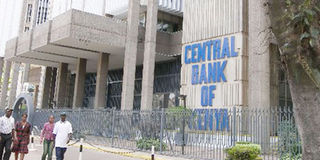Govt cuts '08 growth estimates after weak Q3

Central Bank of Kenya. The government is expected to issue infrastructure bonds worth Sh18bn. Photo/FILE
What you need to know:
- Cuts 2008 GDP growth estimate to 3.5-4.0 percent
- Sees 5.4 percent growth in 08/09 financial year
- $227m bonds to be issued locally in two months
Kenya's economy may have grown by a slower than expected 3.5-4.0 percent in 2008 after declines in tourism and agriculture curbed third-quarter growth to 2.1 percent, a senior government official said on Tuesday.
The government had forecast 4.5-6.0 percent gross domestic product (GDP) growth in 2008, down from 7.0 percent in the previous year, because of the negative impact on the economy of bloody a post-election crisis at the start of the year.
The violence in east Africa's biggest economy shattered its reputation as a beacon of stability in the region, scared away tourists, prevented farmers from planting crops and dented economic activity in general.
"Now, all indications are that 4.5 growth will not be attainable. It could be anything between 3.5-4.0 percent," Geoffrey Mwau, Economic Secretary at Kenya's Ministry of Finance, told Reuters.
Official data released last month showed the tourism sector contracted by 34.7 percent in the third quarter of 2008 while agricultural output declined by 4.7 percent in east Africa's biggest economy.
Mwau said that the pace growth this year depended on the weather and the containment of the global slowdown.
"We are looking at 5.4 percent in the 08/09 fiscal year (July to June), getting to 6.6 percent in 09/10," said Mwau.
President Mwai Kibaki said last month that recessionary global trends were bound to hit Kenya and may affect traditional markets such as horticulture, floriculture and tourism.
Kenya's agriculture sector, which accounts for 25 percent GDP, mainly relies on seasonal rains which failed in the second half of December in many parts of the country.
Infrastructure bonds
Despite worries about growth, the government's policy of investing in infrastructure projects will continue, Mwau said.
"We want to make sure that there are very few cuts on those major infrastructure expenditures because they will be driving the economy," said Mwau.
He said the government was going to issue infrastructure bonds worth 18 billion shillings ($226.7 million) in two months.
The global financial crisis has forced Kenya to shelve plans to raise $500 million for infrastructure development through a debut sovereign bond. Neighbours Uganda and Tanzania have also postponed plans to issue Eurobonds.
"There is still a lot of risk aversion and it is not likely that this will improve in the next three months," said Mwau. "But a lot of action is being taken out there that could improve the environment for bond issuance."
A final decision on how to raise the $500 million would be taken later this year. "We are looking for options, like to what extent we can borrow locally," said Mwau.
"We will make a final decision when we are doing the revised (budget) estimates in March ... the issue will be weighing between which areas to cut back and how much to borrow to make sure we don't destabilise the economy."
Mwau said concerns about harvests might call for more food imports, thus putting pressure on the balance of payments. Kenya is importing five million bags of maize and plans to scrap duty on wheat imports soon to cushion consumers from high prices.
"Food security doesn't mean you should be able to produce everything. The pressure could be on something else like balance of payments," he said.
Kenya's balance of payments surplus fell 84 percent to $74 million in the year to October, although analysts expect the surplus to improve thanks to the fall in oil prices.
Mwau said he expected foreign investments in the Information Communications Technology (ICT) sector to check a deterioration in the balance of payments, once a submarine cable linking the nation to the Middle East is completed in June.
"We expect a lot of interest in ICT," he said.




